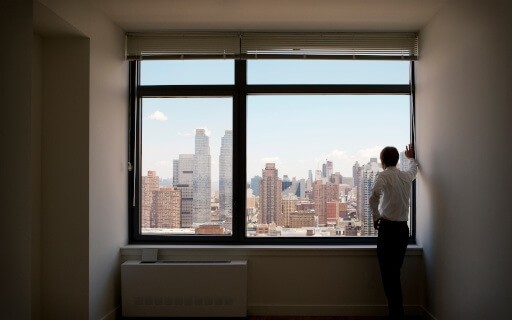
Many first-time landlords begin their careers in the real estate industry by transforming their homes into rental properties. Perhaps you’re looking for an avenue to build wealth or moving but not ready to let go of your abode. Whatever the reason, it’s important to know that there are some things you need to do before converting your primary residence into a rental property. Here are some steps to help you turn your home into a rental.
- Consider your options
- Get your property ready
- Do the paperwork
- Plan for maintenance
- Assess the financials
- Set up a payment system
- Draft a lease agreement
- Market your rental
- Screen tenants and sign leases
1. Consider Your Options
Consider waiting if you have a mortgage
If you have a mortgage on your home, you generally need to live in the house for at least 12 months before converting the property into a rental. Read the contract for your loan and contact your lender to determine the waiting rules that apply to your loan. Once you’ve lived in the house for the required timeframe for your mortgage, you can begin turning your primary residence into a rental property.
It's important to find out what rules are in place to avoid mortgage fraud. If you say you’ll live in the home but purchase it as an investment property, it’s considered a type of mortgage fraud called occupancy fraud. If a lender discovers a property owner has committed occupancy fraud, they could demand immediate payment of the mortgage, which could lead to foreclosure if the property owner does not pay.
Although you might be eager to rent your property, owning a primary residence and converting it later has advantages. Generally, homeowners can have a smaller down payment and lower interest rates when the mortgage loan is for a primary residence, while rates for an investment property or vacation home might be higher.
Find out whether you can get another mortgage
If you’re moving out of your primary home and want to buy another one to live in, you need to find out if you’ll qualify for another mortgage before listing your house for rent. The bank could consider the rental income the property will generate for your new loan, but that’s not always the case. Call your mortgage lender and begin the conversation before moving forward.
Check with your Homeowners Association
If your neighborhood is governed by a Homeowners Association, there might be some restrictions on renting your house. Some HOAs have no restrictions, some prohibit renting out houses completely, and others only allow a certain number of homes in the neighborhood to be used as rentals.
For example, if the HOA only allows eight houses to be rented out, you might be placed on a waiting list until a slot opens. Some neighborhoods will allow owners to rent out their homes if the homeowners are experiencing financial hardship, even if the community has reached its limit. You should also find out who pays HOA fees each month. Since you agreed to follow HOA rules when you purchased the house, it’s important to revisit them to prevent being fined.
2. Get Your Property Ready
Before proceeding with the listing process, you’ll need to ensure your home is in good shape. Keeping your home clean and upgraded can attract renters and show that you care. Furthermore, many common maintenance tasks are important to align with the implied warranty of habitability and secure rental permits.
Renovate it
To attract renters and set a competitive rent price, you’ll probably need to invest in upgrading your house to increase curb appeal. You don’t have to complete a home makeover all at once—start by creating a list of the improvements you envision and complete the renovations over time.
For example, the rental property might be located in a warm climate, so investing in a pool may be worth it, but it’s a luxury amenity that can be put on hold. A good place to start is with low-cost upgrades like adding a fresh coat of paint or updating the light fixtures. Planting flowers or installing a small fountain in the yard can also go a long way.
Make repairs
Begin making any necessary repairs along with the renovations. Everything in the house, including appliances, plumbing, and the HVAC system, should work properly. Check the smoke alarms, fire extinguishers, and carbon monoxide detectors to ensure they function properly and replace them if needed. Other things to look for include water damage, leaky faucets, cracked caulk, and burnt-out light bulbs.
In addition to repairs, preventative measures like termite inspection and electrical maintenance are necessary to prepare your home for renters. Addressing issues before they happen not only spares your renters the inconvenience but can also help minimize maintenance costs.
Deep clean
Deep cleaning your home can be daunting but breaking it down room-by-room can help make it manageable. Make a list of everything that needs to be cleaned and secure all your supplies before you start. Research which cleaners to use on different surfaces and be careful when mixing cleaning supplies.
Don’t forget to clear leaves in the gutters and clogs in the drains. If your home offers a washer and dryer, clean the dryer vent. If your home has carpet, hire a professional carpet cleaner or rent carpet cleaning equipment from a home improvement store.
3. Do the Paperwork
Switch to a landlord insurance policy
Insurance policies for primary homes are very different from those for rental properties, so switching to a landlord policy is important. If you file a claim with your primary insurance after you convert to a rental, the insurer could deny your claim, causing you to pay out of pocket.
Landlord insurance will not only protect you from damage to the rental property, such as a tree falling on the house, but it will also cover legal costs or medical bills if your tenant is injured on your property and you’re found liable. Contact your insurance company when you decide to rent out your home.
Learn about tax changes
It’s recommended to consult an accountant to prepare for your rental property, but there are some basics you should know as a landlord. Your rental income will be taxable, so determine how your tax rate might change. However, once you convert the house to a rental property, you might qualify for tax deductions for rental property expenses, including your landlord insurance policy or utilities, if you pay for them.
Contact your local municipality or tax advisor and ask about the homestead exemption you likely have on your house. You can only have the homestead exemption on your primary residence, so find out the next steps if you want to convert your home into a rental.
Secure the required permits
Municipalities often require permits for residential properties that operate as rentals for safety reasons. These permits are usually not expensive but are necessary in many areas.
Typically, an inspector from the local government will inspect the property for any potential health and safety hazards. For example, the inspector might check electrical, heating, and adequate exits. The inspector will give the landlord a report listing any necessary changes or repairs that need to be made before the property is compliant. Permit requirements vary depending on the location, so contact your local city hall to find out if you need one.
4. Plan for Maintenance

Before you proceed with listing your rental, you’ll need to make a plan to manage maintenance requests. Renovations and competitive prices attract renters, but quick and efficient maintenance can retain tenants.
Anticipate requests
Although some maintenance requests may involve major repairs, most maintenance requests involve routine upkeep. Research common maintenance requests during different seasons and ensure you have the proper equipment and contacts to keep your home in good shape for your tenants.
Establish a request system
Some independent landlords prefer that tenants contact them directly via email or text message to request maintenance. However, using an online maintenance request platform to manage tenants’ maintenance requests may streamline the process and help you keep track of requests.
5. Assess the Financials
Before you set a rent price for your home, consider all financial factors, including rental expenses and the value of your home. Setting an appropriate rent price is important to attract renters while covering your costs. There’s a balance between setting a competitive price and turning a profit.
Evaluate the market
What are rentals similar to yours charging in your area? Our rent comparables tool can help you discover the going price for nearby rental houses with similar square footage and amenities.
Calculate expenses
Turning your home into a rental comes with startup expenses that you’ll want to consider when setting a rent price. Home inspection costs and permitting fees can fluctuate depending on the size and location of your home, so research the going rates in your area. Repairs, renovations, advertising costs, and renter turnover expenses are also important to consider.
In addition to one-time costs, calculate recurring expenses like routine maintenance, pest control, or your insurance premium. If you plan to include utilities in your rent, calculate your house's regular heating, electricity, and water costs. It may be easier to charge utilities separately, since your tenants’ usage may vary month-to-month.
Set a rent price
Once you’ve evaluated your expenses and compared your rental home to nearby competition, it’s time to set your rent price. Your goal in pricing your rental is to turn a profit while competing with the prices of rentals nearby. Make sure that your rent price covers all expenses but doesn’t diverge drastically from similar rentals in your area.
Remember that you can always adjust your rent price, but renters will be more receptive to a decrease than an increase.
6. Set Up a Payment System
Before you draft your lease, you’ll need to decide on a method to collect rent.
Collect rent
While requesting cash, checks, or money orders for rent payments is feasible, an automated online rent collection platform can save you a trip to the bank and allow your tenants flexibility in how they choose to pay their rent.
Some renters may be averse to using an online rent payment system, but clearly communicating the benefits of online rent payments can help get your tenants on board. Conversely, an online payment system may be attractive to renters who prefer automated processes.
Track your income
It’s important to keep track of your revenue and adjust your maintenance budget as needed.
The Apartments.com expense tracker streamlines your bookkeeping. This tool helps you manage your income, expenses, and taxes.
7. Draft a Lease Agreement
Writing a lease agreement can be daunting, but you don’t have to do it alone or from scratch. Our lease agreement tool can help you generate, customize, and send leases to applicants.
Create your lease
While many lease agreements include similar provisions, each rental property outlines its own rules and policies. Common details explained in a lease agreement include guest policies, pet policies, HOA rules, subletting policies, grounds for eviction, and due dates for rent and fees. Your lease should also explain the processes for submitting rent payments and maintenance requests.
Look into the legal implications
Consulting with an attorney is recommended to fine-tune the wording in your lease, but you should have a general understanding of certain laws. Learn about federal and state landlord-tenant laws, along with fair housing laws to avoid violating a tenant’s rights. As a first-time landlord, you’re bound to make mistakes, but educating yourself on these laws will help you avoid negative situations.
A landlord on Reddit said, “Expensive lawyers are cheap insurance. Consult a lawyer that specializes in landlord-tenant law and have them advise you in required laws like escrow and evictions.”
8. Market Your Rental
Now that your rental home is ready for tenants, it’s time to find tenants to lease with you.
Identify your target market
Your home’s location, size, and amenities will attract specific demographics of renters. Identifying the renters who are most likely to be interested in your home will help you pinpoint which amenities to highlight.
Take photos
Photos are vital to marketing your home to potential tenants because they are your home’s first impression on a potential tenant. You don’t have to hire a professional photographer to take pictures of your rental home. If you learn the basics of staging and photographing your home, you can take high-quality pictures on your smartphone that will attract renters.
First, clean and prepare your home. If you’re offering a furnished rental, remove any clutter and add decorative accents to tables and couches. Next, choose the right time of day to photograph your rental. The right lighting and angles can show renters a warm and welcoming environment.
While photos of the exterior are important, focus on the interior. CoStar research found that listings with a living room shot as the primary photo are more likely to attract potential tenants than listings with an exterior shot as the primary photo.
Write a property description
The property description of a rental listing is your opportunity to let your home shine. Highlight any recent renovations or upgrades, neighborhood amenities, and nearby attractions. Tell a story of what a renter’s life would look like living in your rental.
Be transparent about costs and lease terms, such as your pet policy. This will help renters filter through rental listings and limit your applications to serious inquiries.
To ensure your property description is compliant with the Fair Housing Act, avoid indicating a preference for or against groups of people. Violating the Fair Housing Act could result in a lawsuit.
List your house
Finally, it’s time to list your house for rent. Listing your home with Apartments.com is simple and easy and can help you reach millions of potential renters in minutes.
9. Screen Tenants and Sign Leases
The final step before becoming a landlord is finding and screening tenants. This step is important because to whom you choose to lease your rental will be your customer for the length of the lease. A Reddit user said, “An empty unit is better than a bad tenant. Be more selective with what you require of applicants.”
Screen tenants
Screening applicants involves learning about their rental and credit history to predict whether they’ll be a good tenant. While you have the power to choose between tenants, your decision must comply with the Fair Housing Act and be based solely on impartial factors like insufficient income, poor credit or rental history, or a criminal record.
Our tenant screening tool smooths the tenant screening process. Apartments.com partners with TransUnion, one of the three major credit bureaus, to provide a ResidentScore based on an applicant’s credit history. The tool can help you pick tenants who are most likely to pay rent on time and leave your home in good condition.
Learn from previous landlords
Requesting a landlord reference can give you insight into potential tenants’ renting behavior. Contacting a landlord reference can clue you in on any red flags that may not show up in a credit check or background check, like the applicant’s communication style.
You can request a landlord reference in your rental application and add a section where applicants can consent to you contacting their references.
Negotiate rent
Your potential tenant may want to negotiate a lower rent price. Before dismissing the idea, consider the applicant’s side and the benefits of reaching an agreement.
If your potential renter requests a lower rent price due to personal issues, be receptive and considerate if they choose to disclose the details with you. If their reasoning is based on market trends, do some research and reference your rent comp report to make a decision.
Negotiating with a potential tenant could fill a vacancy and show that you care. Being personable and willing to discuss rent can help retain good tenants.
Owning rental property can help set you up for financial success, but converting your home into a rental and becoming a landlord can be intimidating at first. However, it's certainly doable with some patience, research, and communication with the appropriate professionals.
Apartments.com Rental Tools can help you manage landlord tasks, and our blog is filled with articles to answer any of your questions. Embrace the journey, and good luck!
Originally published on December 21, 2020, by Jamia Kenan.
FAQs
What are the pros and cons of listing a property for rent?
Turning your home into a rental property is a big commitment, and it’s important to evaluate realistically whether owning a rental property is right for you. Here are a few advantages and disadvantages to renting out your house.
Pros
- Owning rental property is a great way to build wealth and diversify or supplement your income.
- The income you receive can help pay down your mortgage while also providing extra cash flow.
- If your home has been on the market for a long time and you haven’t received an offer that allows you to break even, you can postpone selling the house.
- Renting is a great option if you inherited a property but don’t want to live there or sell it.
- Turning your home into a rental can qualify you for tax deductions.
Cons
- Managing the rental yourself can be very time-consuming.
- You’ll have to handle rental property expenses including real estate attorney fees, landlord insurance, and routine maintenance.
- Since markets fluctuate, your rental property might produce less rental income than expected.
- There are some risks like theft and vandalism if your rental stays vacant for too long.
How do I know if someone will be a good tenant?
The importance of background checks in screening tenants cannot be overstated. Verifying an applicant’s employment and income will let you know if they can pay rent on time. Checking an applicant’s credit score and rental history will clarify issues with previous landlords and rent payments.
Landlords on Reddit emphasize the importance of background checks and renter interviews. A user said, “Check their credit and their background before signing the lease. It feels weird at first, but is really important.”
Other landlords say that getting to know an applicant can show you any red flags before they sign a lease. Another Reddit user said, “‘My last landlord did this and that’ is a good tell. Even if their last landlord was a complete monster, highly accountable people don’t sit there complaining about it."
Can I list my house on Apartments.com?
Yes, you can list your rental on Apartments.com for free. Just go to the homepage and click on "Add a Property." Fill out the information, including the address and property type, and add some photos. Whether it's a single-family house, a duplex, an apartment or condo, or even a room for rent, there's a place for your listing on Apartments.com.











